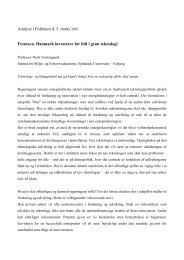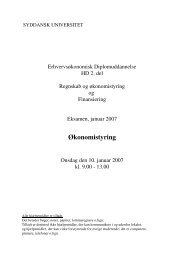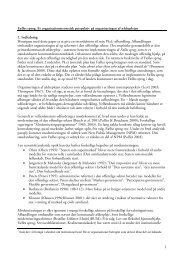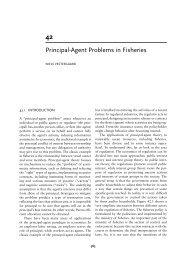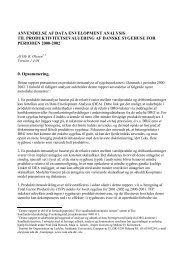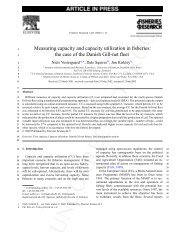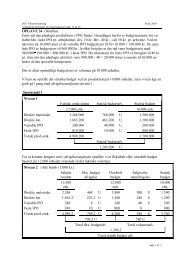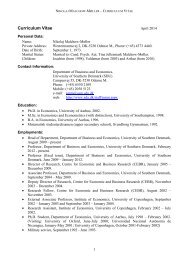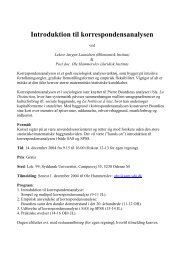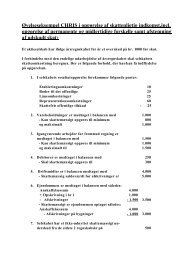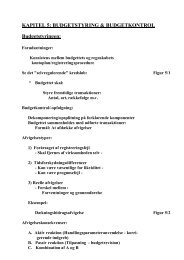determ<strong>in</strong>ed primarily by “political motivated policy blame”, not like at the first elections by“political motivated system blame”.1.5. Consolidation <strong>of</strong> democracyWhen deal<strong>in</strong>g with post-communism most observers focuse on questions about stabilization <strong>and</strong>consolidation <strong>of</strong> democracy.Explanations can be clustered about three sets <strong>of</strong> variables 6 :• Structural, e.g. level <strong>of</strong> socio-economic development, patterns <strong>of</strong> modernization <strong>and</strong><strong>in</strong>dustrialization, <strong>and</strong> prevail<strong>in</strong>g cultural patterns, all <strong>of</strong> which can be l<strong>in</strong>ked to themodernization paradigm• Institutional, such as designs <strong>of</strong> executive-legislative relations <strong>and</strong> electoral systems <strong>and</strong> theshape <strong>of</strong> parties <strong>and</strong> party systems• And actor-behavioural, such as the power constellation <strong>of</strong> elites or even very particular <strong>and</strong>cont<strong>in</strong>gent policy decisions. In other words, <strong>in</strong> this case emphasis is laid on the policy-content.• F<strong>in</strong>ally the policy <strong>and</strong> programme level has to be <strong>in</strong>cluded, by that twe mean the ability <strong>of</strong>parties to solve the “day to day” problems <strong>and</strong> formulate long-term consistent politicalprogrammes.As put by Andreas Schedler, consolidation has been an outmost ambiguous concept <strong>and</strong> a “mov<strong>in</strong>gtarget” due to the fact that <strong>in</strong> fact consolidation “never ends”. The concept does not have a coremean<strong>in</strong>g, for many it has been treated as a catch-all concept <strong>and</strong> for that reason used <strong>in</strong> differentmean<strong>in</strong>gs. Furthermore, deal<strong>in</strong>g with the different types <strong>of</strong> democracy Andreas Schedlerdist<strong>in</strong>guishes between authoritarian, electoral, liberal <strong>and</strong> advanced democracies, <strong>and</strong> <strong>in</strong> that contexthe argues <strong>in</strong> favour <strong>of</strong> a “peaceful coexistence” between the different <strong>in</strong>terpretations <strong>and</strong> mean<strong>in</strong>gs<strong>of</strong> the concept.Moreover, Schedler argues that <strong>in</strong>stitutional <strong>in</strong>security <strong>and</strong> blurred <strong>and</strong> temporary boundaries <strong>of</strong>democratic transition must be considered as a def<strong>in</strong><strong>in</strong>g feature <strong>of</strong> democratization, therebyrecogniz<strong>in</strong>g structural fuzz<strong>in</strong>ess <strong>of</strong> transition <strong>and</strong> consolidation. If uncerta<strong>in</strong>ty is taken seriously,regime transition <strong>and</strong> consolidation can not be regarded as discrete stages with neat start<strong>in</strong>g po<strong>in</strong>ts<strong>and</strong> endpo<strong>in</strong>ts. Rather they have to be conceived as vague periods <strong>of</strong> <strong>in</strong>stitutional fluidity whoseouter boundaries are <strong>in</strong>determ<strong>in</strong>ate 7 .Lucan A. Ways’ notion “pluralism by default” focus on the political competition specific to weakstates, e.g. Moldova <strong>and</strong> to a large extent Ukra<strong>in</strong>e <strong>and</strong> Belorussia. Pluralism by default describescountries <strong>in</strong> which <strong>in</strong>stitutionalized political competition survives not because leaders are especially6 See Petr Kopecký <strong>and</strong> Cas Mudde, ”Expla<strong>in</strong><strong>in</strong>g Different Paths <strong>of</strong> Democratization: The Czech <strong>and</strong> SlovakRepublics”, Journal <strong>of</strong> Communist Studies <strong>and</strong> Transition Politics, Vol. 16, No. 3, September 2000:69-70.7 Andreas Schedler, “What is Democratic Consolidation?”, Journal <strong>of</strong> Democracy, volume 9, No. 2, April 1998:91-107,<strong>and</strong> “Tak<strong>in</strong>g Uncerta<strong>in</strong>ty Seriously: The Blurred Boundaries <strong>of</strong> Democratic Transition <strong>and</strong> Consolidation”,Democratization, Vol. 8, No. 4, W<strong>in</strong>ter 2001:17-19 <strong>and</strong> “To take Uncerta<strong>in</strong>ty Seriously: The Blurred Boundaries <strong>of</strong>Democratic Transition <strong>and</strong> Consolidation, Democratization, Vol.8, No.4, W<strong>in</strong>ther 2001:1-22..18
democratic or because societal actors particularly strong, but because the government is to<strong>of</strong>ragmented <strong>and</strong> the state at the same time too weak to impose authoritarian rule 8 . Moreover, FraneAdam <strong>and</strong> Matej Makarovic argue that some new post-communist democracies may be labelled“deficient” 9 . The <strong>in</strong>stitutional structures, the cultural patterns, <strong>and</strong> the prevail<strong>in</strong>g attitudes with<strong>in</strong> thepublic sphere <strong>and</strong> among the political elites are basically democratic. But deficiencies like<strong>in</strong>strumental underst<strong>and</strong><strong>in</strong>g <strong>of</strong> democracy, lack <strong>of</strong> efficiency <strong>in</strong> democratic <strong>in</strong>stitutions <strong>and</strong> lack <strong>of</strong>trust <strong>in</strong> the system, limited elite circulation <strong>and</strong> media pluralism, etc., are still present, however, to adifferent extent <strong>in</strong> each country. Those deficiencies can be found on all democratic arenasmentioned below.In the case <strong>of</strong> democracy by design”, known from presidential rule <strong>and</strong> delegative democracy <strong>in</strong>Russia, those <strong>in</strong> control <strong>of</strong> the state mach<strong>in</strong>ery attempt to <strong>and</strong> may succed <strong>in</strong> shap<strong>in</strong>g the <strong>in</strong>stitutions<strong>and</strong> procedures <strong>of</strong> a competitive election <strong>in</strong> ways that ensure an outcome favorable to the designersthemselves 10 .Juan J. L<strong>in</strong>z <strong>and</strong> Alfred Stepan (L<strong>in</strong>z, Stepan, 1996:7) underl<strong>in</strong>e that democratic consolidationrequires much more than just elections <strong>and</strong> markets. Consolidated democracies requires a state, i.e.that stateness problems have been solved, that five <strong>in</strong>teract<strong>in</strong>g arenas have to be <strong>in</strong> place <strong>in</strong> order forconsolidation to exist, first a free <strong>and</strong> lively civil society, second a relatively autonomous <strong>and</strong>valued political society, third a rule <strong>of</strong> law, fourth a state bureaucracy that is usable <strong>and</strong> fifth, an<strong>in</strong>stitutionalized economic society. Reform <strong>of</strong> public adm<strong>in</strong>istration has been a crucial element <strong>in</strong>build<strong>in</strong>g a democratic state. The problems connected to weak adm<strong>in</strong>istrative structures have beencompounded by the absence <strong>of</strong> an effective (<strong>and</strong> honest) civil service <strong>and</strong> pr<strong>of</strong>essional central <strong>and</strong>local adm<strong>in</strong>istrators (Sakwa, 2002:123).L<strong>in</strong>z <strong>and</strong> Stepan argue (L<strong>in</strong>z, Stepan, 1996:3) that transition to democracy has gone towardcompletion“when sufficient agreement has been reached about political procedures to produce an electedgovernment, when a government comes to power that is the direct result <strong>of</strong> a free <strong>and</strong> popular vote,when this government de facto has the authority to generate new politics, <strong>and</strong> when the executive,legislative <strong>and</strong> judicial power generated by the new democracy does not have to share power withother bodies de jute”In the first stage <strong>of</strong> post-communism the <strong>in</strong>stitutions vital for a consolidated democracy e.g.political parties, elected parliaments <strong>and</strong> <strong>in</strong>dependent courts, have been established, but they do notfunction <strong>in</strong> optimal ways seen <strong>in</strong> the context <strong>of</strong> consolidation <strong>of</strong> democracy. As regardsconsolidation <strong>of</strong> democracy, all the Central European countries have passed the ”two-turn over test”as the political power has been h<strong>and</strong>ed over to the opposition peacefully <strong>in</strong> the case <strong>of</strong> electiondefeat for the rul<strong>in</strong>g parties, but the democracy <strong>in</strong> the CEEC's can hardly be considered asconsolidated <strong>in</strong> more “advanced” sense. Democratic consolidation require e self-limitation by thepower holders as well as by the opposition. Political fundamentalism, political capitalism, identity8 Lucan A. Way, “Pluralism by Default <strong>in</strong> Moldova”, Journal <strong>of</strong> Democracy, Volume 13, Number 4, October 2002:127-141.9 Frane Adam <strong>and</strong> Matej Makarovic, “Postcommunist Transition <strong>and</strong> Social Science:The Case <strong>of</strong> Slovenia”, EastEuropean Quarterly, XXXVI, No. 3, September 2002.10 Michael Urban, “December 1993 as a Replication <strong>of</strong> Late-Soviet Electorale Practices”, Post-Soviet Affaires, Vol. 10,No. 2 (April-June 1994):128.19
- Page 3: “This provisional situation chara
- Page 6 and 7: marketisation and privatisationshor
- Page 8 and 9: purposes, are channels for “expre
- Page 10 and 11: the significance of strategic choic
- Page 12 and 13: presidentialism gave rise to “flo
- Page 14 and 15: antipolitics and reinforcement of a
- Page 16 and 17: In the late 1990’s elections most
- Page 20 and 21: politics and antipolitics, all sign
- Page 22 and 23: which attitudes to state regulation
- Page 24 and 25: Anti-communism has been defined in
- Page 26 and 27: elections and the Slovak communists
- Page 28 and 29: Cartel agreementsbetter representat
- Page 30 and 31: Basically the absence of clear cons
- Page 32 and 33: After 1989 different types of polit
- Page 34 and 35: complex project for transition unde
- Page 36 and 37: window of opportunity in spite of s
- Page 38 and 39: analyses of party institutionalizat
- Page 40 and 41: political messages and slogans. Thu
- Page 42 and 43: well established party culture may
- Page 44 and 45: expected, much due to the many spli
- Page 46 and 47: Furthermore, the polarisation on el
- Page 48 and 49: Finally, Solidarity can also be con
- Page 50 and 51: whole, on the one side an authorita
- Page 52 and 53: The economic recession and the grav
- Page 54 and 55: election defeat more cooperation an
- Page 56 and 57: The formation of AWS can be conside
- Page 58 and 59: group. RS AWS constituted the Chris
- Page 60 and 61: According to the original plans the
- Page 62 and 63: values. According to Rybicki, as so
- Page 64 and 65: AWS should fight against all types
- Page 66 and 67: 2001 parliamentary election, howeve
- Page 68 and 69:
and workers voted ZChN. At the 1993
- Page 70 and 71:
The League has been considered as a
- Page 72 and 73:
establishment like than LPR’s. Th
- Page 74 and 75:
jobs in rural areas, especially sma
- Page 76 and 77:
industrial policy. According to the
- Page 78 and 79:
pressurizing the government to give
- Page 80 and 81:
democrats, thereby locating itself
- Page 82 and 83:
To conclude, the Freedom Union (UW)
- Page 84 and 85:
Polish middle class. Thus, in Janua
- Page 86 and 87:
such as KSCM and KSS in The Czech R
- Page 88 and 89:
The SLD leaders were mainly recruit
- Page 90 and 91:
the falling popular support for pri
- Page 92 and 93:
innovation was formation of the pol
- Page 94 and 95:
place after talks with each applica
- Page 96 and 97:
Has the Left any freedom of manoeuv
- Page 98 and 99:
medicine, changes in the labour cod
- Page 100 and 101:
The Labour Union (UP), Democratic U
- Page 102:
Nevertheless, before that had taken



